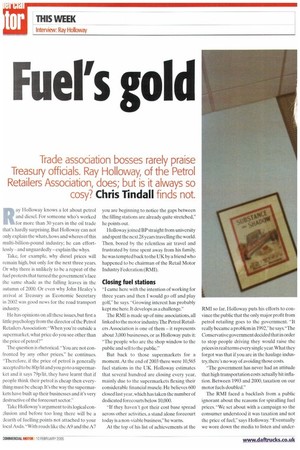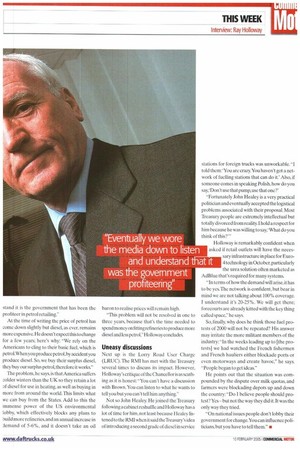Rue 's gold
Page 24

Page 25

If you've noticed an error in this article please click here to report it so we can fix it.
Trade association bosses rarely praise Treasury officials. Ray Holloway, of the Petrol Retailers Association, does; but is it always so
cosy? Chris Tindall finds not.
Ray Holloway knows a lot about petrol and diesel. For someone who's worked for more than 30 years in the oil trade that's hardly surprising. But Holloway can not only explain the whats, hows and wheres of this multi-billion-pound industry; he can effortlessly — and unguardedly — explain the whys.
Take, for example, why diesel prices will remain high, but only for the next three years. Or why there is unlikely to be a repeat of the fuel protests that turned the government's face the same shade as the falling leaves in the autumn of 2000. Or even why John Healey's arrival at Treasury as Economic Secretary in 2002 was good news for the road transport industry.
He has opinions on all these issues, but first a little psychology from the director of the Petrol Retailers Association: "When you're outside a supermarket, what price do you see other than the price of petrol?"
The question is rhetorical. "You are not confronted by any other prices," he continues. 'Therefore, if the price of petrol is generally accepted to be 80p/lit and you go to a supenuarket and it says 79p/lit, they have learnt that if people think their petrol is cheap then everything must be cheap. It's the way the supermarkets have built up their businesses and it's very destructive of the forecourt sector.
Take Holloway's argument to its logical conzlusion and before too long there will be a dearth of fuelling points not attached to your local Asda."With roads like the A9 and the Al you are beginning to notice the gaps between the filling stations are already quite stretched," he points out.
Holloway joined BP straight from university and spent the next 28 years travelling the world. Then, bored by the relentless air travel and frustrated by time spent away from his family, he was tempted back to the UK by a friend who happened to be chairman of the Retail Motor Industry Federation (RMI).
Closing fuel stations
came here with the intention of working for three years and then I would go off and play golf," he says. "Growing interest has probably kept me here. It develops as a challenge."
The RMI is made up of nine associations, all linked to the motor industry.The Petrol Retailers Association is one of them — it represents about 3,000 businesses, or as Holloway puts it: "The people who are the shop window to the public and sell to the public."
But back to those supermarkets for a moment. At the end of 2003 there were 10,565 fuel stations in the UK. Holloway estimates that several hundred are closing every year, mainly due to the supermarkets flexing their considerable financial muscle. He believes 600 closed last year, which has taken the number of dedicated forecourts below 10,000.
"If they haven't got their cost base spread across other activities, a stand alone forecourt today is a non-viable business," he warns.
At the top of his list of achievements at the RMI so far. Holloway puts his efforts to convince the public that the only major profit from petrol retailing goes to the government. "It really became a problem in 1992," he says."The Conservative government decided that in order to stop people driving they would raise the prices in real terms every single year. What they forgot was that if you are in the haulage industry, there's no way of avoiding those costs.
"The government has never had an attitude that high transportation costs actually hit inflation. Between 1993 and 2000, taxation on our motor fuels doubled."
The RMI faced a backlash from a public ignorant about the reasons for spiralling fuel prices. "We set about with a campaign so the consumer understood it was taxation and not the price of fuel," says Holloway. "Eventually we wore down the media to listen and under stand it is the government that has been the profiteer in petrol retailing."
At the time of writing the price of petrol has come down slightly but diesel, as ever, remains more expensive. He doesn't expect this to change for a few years; here's why: -We rely on the Americans to cling to their basic fuel, which is petrol .Whenyou produce petrol,by accident you produce diesel. So, we buy their surplus diesel, they buy our surplus petrol,therefore it works."
The problem, he says, is that America suffers colder winters than the UK so they retain a lot pf diesel for use in heating, as well as buying in more from around the world. This limits what we can buy from the States. Add to this the immense power of the US environmental lobby, which effectively blocks any plans to build more refineries, and an annual increase in dem and of 5-6%, and it doesn't take an oil baron to realise prices will remain high.
"This problem will not be resolved in one to three years, because that's the time needed to spend money on fitting refineries to produce more diesel and less petrol,Holloway concludes.
Uneasy discussions Next up is the Lorry Road User Charge (LAU C). The RM." has met with the Treasury several times to discuss its impact. However, Holloway's critique of the Chancellor is as scathing as it is honest: "You can't have a discussion with Brown. You can listen to what he wants to tell you but you can't tell him anything."
Not so John Healey. He joined the Treasury following a cabinet reshuffle and Holloway has a lot of time for him, not least because Healey listened to the RMI when it said the Treasury's idea of introducing a second grade of diesel in service stations for foreign trucks was unworkable. "I told therm 'You arc crazy. You haven't got a network of fuelling stations that can do it.' Also, if someone comes in speaking Polish, how do you say,'Don't use that pump, use that one?'
"Fortunately John Healey is a very practical politician and eventually accepted the logistical problems associated with their proposal. Most Treasury people are extremely intellectual but totally divorced from reality. I hold a respect for him because he was willing to say.'What do you think of this?"
Holloway is remarkably confident when asked if retail outlets will have the necessary infrastructure in place for Euro4 technology in October, particularly the urea solution often marketed as AdBlue that's required for many systems.
"In terms of how the demand will arise. it has to be yes. The network is confident. but bear in mind we are not talking about 100% coverage. I understand it's 20-25%. We will get there; forecourts are already kitted with the key thing called space," he says.
So, linally, why does he think those fuel protests of 2000 will not be repeated? His answer may irritate the more militant members of the industry: "In the weeks leading up to [the protests] we had watched the French lishermen and French hauliers either blockade ports or even motorways and create havoc." he says. "People began to get ideas."
He points out that the situation was compounded by the dispute over milk quotas, and farmers were blockading depots up and down the country: "Do I believe people should protest? Yes — but not the way they did it. It was the only way they tried.
"On national issues people don't lobby their government for change. You can influence politicians, but you have to tell them." •






































































































































































































